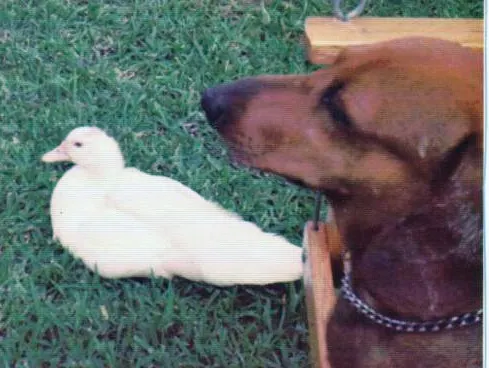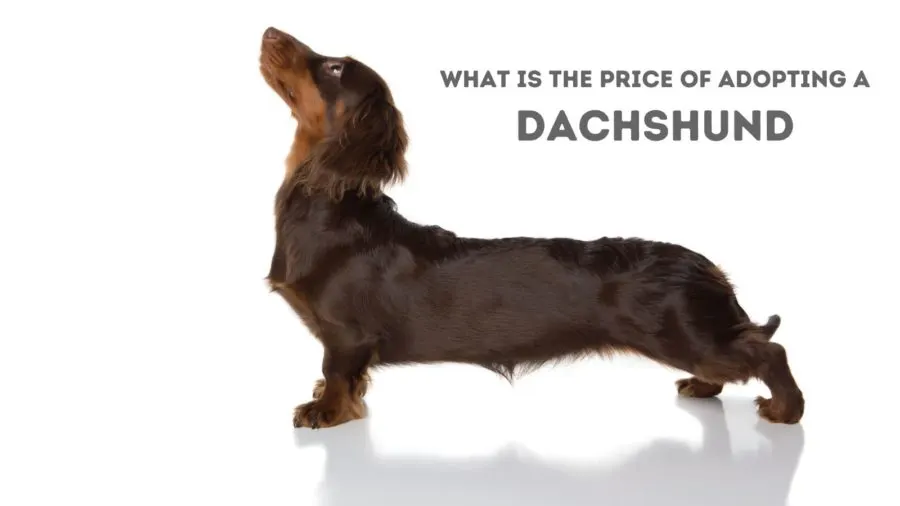Are you considering adding a Dachshund to your family? Whether you call them a Dachshund, Doxie or Sausage Dog, this longtime breed is adventurous and vigilant, both in Standard and Mini sizes. If you are curious about the price of a Dachshund, you’ll find that the price of depends on several factors, most especially where you are obtaining the dog. In this post, we’ll look at the Dachshund price — as well as the pros and cons — of obtaining a Standard or a Miniature Dachshund from a breeder, a breed rescue and a shelter, comparing the services you’ll receive from each.

Our Dachshund Spotlight: Peanut
My childhood dog was a standard Dachshund named Peanut (due to my love of all things Charlie Brown). My father was still in the military when Peanut joined our family in Missouri so he made several moves with us before settling in central Texas–where he was soon joined by another family pet: a duck named Daisy.

Peanut and Daisy became best friends, sharing everything from a dog house to a dog swimming pool When Peanut was paralyzed due to intervertebral disc disease (IVDD), had back surgery and had to learn to walk once again, it was Daisy who got him moving and swimming. Years later, their friendship was the subject of my first big magazine sale: a story call “The Dachshund and The Duck” for Reader’s Digest magazine.
Did You Know? Dachshund is German for “badger dog,” a reminder of the first job of this breed: hunting badgers and boars. This instantly-recognizable dog is one of the most popular breeds in the US, consistently ranking among AKC’s top 10 breeds, and is celebrated every year on National Dachshund Day.
How Much Does a Dachshund Cost from a Breeder?
The price of a Dachshund puppy from a breeder can range anywhere from $500-$3500–although most will be priced from $600-1200. Doxies from “show lines” can be priced at two to three times the price of other puppies.
The price will depend on several factors:
- The coat type of the Dachshund. Wirehaired Dachshunds are the most expensive, followed by Longhaired Dachshunds and finally the most common Smooth Dachshunds.
- The size of the Doxie puppy. Miniature Dachshunds (11 pounds and smaller) are generally more popular–and thus more expensive–than Standard Dachshunds.
- The color of the Dachshund. AKC recognized 12 standard color and color combinations in Dachshunds and three non-standard colors. Puppies with more common colors–such as Red or Black and Tan–will be priced lower. Unusual colors and color combinations–such as the rare solid Black, Wild Boar, or Blue and Cream–will be higher priced.
- The genetic testing that has been done on the Dachshund puppy’s parents. The best Dachshund breeders will have dogs that have passed health screenings and have Canine Health Information Center (CHIC) numbers. Dogs can only be granted a CHIC number by taking mandatory health screenings. (You’ll find a list of the mandatory health screenings–and the optional screenings–in the health section below.)
- The location of the breeder. Dachshunds in large metropolitan areas are often priced higher than dogs in less crowded parts of the country–supply and demand, you know.
- The pedigree of the parents. Show Dachshunds that have participated in sanctioned competitions have more expensive litters than Doxies without titles.
- Whether the Dachshund puppy for sale is a show quality dog or a pet quality dog. Most breeders will require that pet quality dogs be spayed/neutered at the appropriate age. Show quality puppies with a future in competitive dog shows and breeding are more expensive.
- The age of the dog. Dachshund puppies, like all other breeds, are definitely more expensive than adult dogs.
When adopting from a breeder, it’s especially important to make sure you are adopting from a reputable breeder—not a backyard breeder and not an online seller. Below we’ll look at how you can be sure you are talking with a responsible Dachshund breeder.
Health Tests for Dachshunds
Be sure to ask about which tests and evaluations the puppy’s parents have undergone before you make your purchase. Good breeders will include a health guarantee.
Like all breeds, Dachshunds are susceptible to hereditary diseases—as well as orthopedic issues due to their long back—so reputable breeders will conduct testing on both parents to help ensure a healthy litter.
The Dachshund Club of America, the official AKC Parent Club for the Dachshund breed, recommends these tests as mandatory for the parents of Dachshund puppies:
- Luxating Patella: This test, for dogs age 12 months and older, tests for kneecaps that pop out of socket.
- Eye Exam: Annual OFA Eye Certification exams (previously called CERF exams) by a Board Certified Canine Ophthalmologist; the exam should be is registered with OFA. This exam is done on breeding dogs age 2 or older.
- Basic Cardiac Exam: Again, this test is performed on the parents prior to breeding (although a test on puppies will, in many cases, detect early issues.)
And these tests are optional:
- LaFlora Disease: This disease, most prevalent in miniature Wirehaired Dacshunds, is a form of epilepsy.
- Progressive Retinal Atrophy RCD4
- Intervertebral Disc Disease (IVDD): This spinal condition is especially problematic in breeds with longer backs.
Dachshund parents with Canine Health Information Center (CHIC) numbers will have had several additional screenings including Autoimmune thyroiditis and Congenital Deafness.
If you adopt a rescue Dachshund or Miniature Dachshund, you most likely won’t have the benefit of these tests that good breeders will have run–but you can run the Embark Dog DNA Test using a simple saliva test. It tests for over 215 genetic diseases and conditions–including these conditions that are common in Dachshunds and Miniature Dachshunds:
- Degenerative Myelopathy, DM (SOD1A)
- Mucopolysaccharidosis Type IIIA, Sanfilippo Syndrome Type A, MPS IIIA (SGSH Exon 6, Dachshund Variant)
- Narcolepsy (HCRTR2 Exon 1, Dachshund Variant)
- Neuronal Ceroid Lipofuscinosis 1, NCL 1 (PPT1 Exon 8, Dachshund Variant 1)
- Neuronal Ceroid Lipofuscinosis 2, NCL 2 (TPP1 Exon 4, Dachshund Variant 2)
- Progressive Retinal Atrophy, crd4/cord1 (RPGRIP1)
- Chondrodystrophy and Intervertebral Disc Disease, CDDY/IVDD, Type I IVDD (FGF4 retrogene – CFA12)
- Limb-Girdle Muscular Dystrophy 2D (SGCA Exon 3, Miniature Dachshund Variant)
- Osteogenesis Imperfecta, Brittle Bone Disease (SERPINH1, Dachshund Variant)
How to Find a Reputable Dachshund Breeder
- Check the “Find a Dachshund” link on the Dachshund Club of America site.
- Attend a sanctioned dog show and talk with breeders and competitors for recommendations.
- Ask your veterinarian for recommendations regarding reputable breeders.
Once you’ve found a few names, do an online search to learn more and narrow your list.
Search for “BREEDER NAME complaints” or “BREEDER NAME scam” to see if you find complaints. Are there any Better Business Bureau (BBB) complaints? Check the Facebook page of the Dachshund breeder and read through the comments. (Remember, however, that comments can be deleted by the page owner.)
Once you’ve narrowed your choice, it’s time to talk to the breeder:
- Ask for references. The breeder should be happy to share the name and contact information for customers.
- Ask questions. Lots of questions. The breeder should be happy to answer questions about the puppy, the puppy’s parents (and grandparents!), the socialization the puppy has received, the health tests and screening he has received and more. The breeder should be glad to share the test results from the health tests and screenings and should be happy to let you meet at least the mother (if not the sire as well) of the Dachshund puppies.
- Ask how often the dogs are bred. A breeder shouldn’t have Dachshund puppies for sale at all times; reputable breeders will selectively breed and only have puppies for sale occasionally.
- Ask to tour the kennels. Are they well maintained? Do the dogs look healthy? Beware of operations that will not let you tour the kennels and breeders that want to meet you in a parking lot to hand over the puppy.
- Be prepared for questions. The breeder should ask YOU questions as well; be suspicious if the breeder has no questions about your past history with pets, your living situation, etc.
- Ask if the breeder will take the puppy back if necessary. Reputable breeders should not only agree to accept the dog if it doesn’t work out or even upon your death—but require that the Dachshund be returned to them for rehoming.
- Ask for a contract. VCA Animal Hospital recommends that the breeder “Provides a written contract with a guarantee of health allowing time for a pre-purchase examination by a veterinarian of your choice. If medical problems are diagnosed, the breeder should readily take the pup back and provide a full refund.”
- Ask for registration papers in your name.
Dachshund breeders and Miniature Dachshund breeders may adopt out of the area but, nonetheless, you will want to go to the breeder to meet the parents, view the kennels and bring home your puppy in person. This will add to your expenses—but breeders that transport a puppy by air are putting the dog at risk.
If you want to buy a puppy from an online breeder, please think again. There are numerous scams; people spend thousands of dollars for a dog and never receive a puppy. AKC warns potential pet parents to be wary of any seller asking for payment by Venmo, in gift cards or as a wire transfer.
Sadly many dogs sold online and in pet shops are often the result of puppy mills, places where dogs live 24/7 in terrible conditions without human socialization and often with serious health issues. Dogs purchased from puppy mills can mean years of heartache and expensive veterinary care–and perpetuation of a cruel industry.
The pros of purchasing from a Dachshund breeder:
- You may be able to select a puppy—including a choice of color, Standard or Miniature, hair type and gender.
- You may obtain health screenings for the puppy’s parents.
- A reputable breeder will be passionate about Dachshunds and will a resource for years to come.
The cons of purchasing from a Dachshund breeder:
- You will pay far more for a Dachshund from a breeder than a rescue or shelter. If you find a breeder who has Miniature Dachshund puppies for sale at prices much lower than you are seeing from other breeders, you must suspect you are dealing with a backyard breeder who has not done health screening, with an online seller who is operating a puppy mill or with someone who is running a scam. Beware.
- You will need to wait until puppies are available.
- You will need to do your own due diligence to select a reputable breeder.
What’s the Price of Adopting a Dachshund at a Breed Rescue?
Dachshunds in rescues are far less expensive that those at a breeder. Generally the price of a Dachshund or Miniature Dachshund at a breed rescue will range from $150-$500, depending on the location and the age of the dog. Puppies under a year old will be the most costly.
A breed rescue is, like the name suggests, a pet rescue that is specifically for one breed of dog. You’ll find purebred standard Dachshunds and miniature Dachshunds at some rescues; other breed rescues also include purposeful Doxie mixes such as Dorgis, and probable mixes based on appearance.
Breed rescues are generally small non-profit groups that operate through a foster system of volunteers who love the breed. Because of the time the dog spends in their home while waiting for adoption, the foster will be able to tell you about the dog’s personality, likes and dislikes–and what type of home this dog would do best in.
When you find a Dachshund in a breed rescue, that puppy or dog will have received a long list of valuable services:
- Spay/neuter, in most cases
- Age appropriate shots
- Heartworm screening and monthly preventative
- De-worming
- Wellness visit
- Any veterinary care the dog may have required while waiting for adoption
The cost of these services, depending on your vet and the gender of your dog, could range from $300-500 if you went to purchase the same services.
Related post: 200+ Dachshund Names For Your Sausage Dog!
How to Find Breed Rescues
Many breed rescues list their adoptable Dachshunds on large adoption sites such as:
Search these sites by breed to see if breed rescues in your area have adoptables. If you find a potential match, you’ll then make an application directly to the rescue.
Breed rescues generally have more stringent adoption processes to ensure a good fit both for you and the Dachshund. Some may require a home visit; most will want to do a veterinary check and a reference check with non-relatives.
The dogs that are up for adoption at Dachshund rescues may be there for a variety of reasons:
- Death of an owner.
- Change in owner’s living situation. Maybe they moved out of pet-friendly housing, had health challenges, were no longer able to afford the cost of a dog, had a baby and no longer wanted a dog, got a new boyfriend who didn’t like dogs…the reasons run the gamut.
- Owners that weren’t able to care for a Dachshund with spinal issues.
- Lost dogs that the rescue had seen on shelter websites.
Whatever the reason, Dachshunds in rescue may or may not come with papers, depending on whether or not the dog was surrendered with papers.
Dachshund Rescues
To find a breed rescue that specializes in Doxies, search for “Dachshund rescue near me.” Some rescues will only adopt in state or to surrounding states due to the fact that many require a home visit.
Here’s a look several breed rescues:
- Diamond Dachshund Rescue of Texas: We’ve met representatives from this rescue at many pet expos; they adopt out 100-200 Dachshunds and Miniature Dachshunds every year.
- Dachshund Rescue of Los Angeles: Working to reduce euthanasia in local shelters, this rescue also has a sister organization, the Dachshund Rescue of Utah, which adopts to dog lovers in Utah and surrounding states.
- Little Paws Dachshund Rescue: This rescue has foster homes all along the East Coast as well as into some southern and midwest states.
The Pros of Adopting from a Dachshund Rescue
- You will be saving a life. Most dogs at breed rescues are pulled from shelters, often open-intake shelters that may not be no-kill shelters.
- You will be able to adopt a Dachshund, Miniature Dachshund or Dachshund mix for far less money than purchasing a dog from a breeder.
- You will be able to talk with people who are passionate about the breed about the individual dog you are interested in adopting.
- You will have a network of assistance to help with your questions as you integrate a new Dachshund into your home.
The Cons of Adopting from a Breed Rescue
- You may or may not be able to find an Dachshund puppy. Our most recent search brought up an 6-month-old Doxie so it’s definitely a possibility.
- Unless the rescue knows the history of the dog, you most likely won’t know if the dog’s parents had the health screenings we discussed above.
- Your dog may or may not be a purebred Dachshund and may or may not have papers. Some dogs are turned into breed rescue by owners who have papers and a full background on the dog, however.
What’s the Price of Adopting a Sausage Dog at a Shelter?

The least expensive option when it comes to the price of a Dachshund is the shelter, either a municipal animal shelter or a privately-operated shelter. Generally you can expect to pay $50-150 at a municipal shelter and slightly more at a privately-operated shelter.
At a shelter or in online shelter listings, you are going to have to rely more on your knowledge of the Dachshund appearance than you would at a breed rescue.
Just because you see a puppy listed as a Dachshund, it may or may not be. Shelters use their best judgement, often while intaking many dogs, so sometimes the accuracy of the breed is questionable. And a growing number of shelters don’t attempt to guess at the breed of a dog but instead label them as “mixed breed” in the listings.
So how can you improve your chances of finding a Doxie at a shelter? You can scroll through the listings–but you’ll want to look for the Dachshund’s distinctive look. Dachshunds are definitely one of the easier breeds for shelters to identify so you will find many adoptables from this popular breed.
To improve your chances:
- Check purebred photos and learn the look–at a variety of ages. Check purebred sites of breeders and the breed club to learn what purebred Dachshunds look like as puppies, juveniles and adults.
- Look for long ears and short legs–the easiest way to spot a Doxie!
- Look for almond shaped, dark rimmed eyes.
- Look for a tail out out from the body, not curled over the body or drooping.
Like dogs at breed rescues, most shelter dogs have seen a veterinarian and received a whole suite of treatments including spay/neuter, shots appropriate for their age, deworming, microchipping and more. Purchased separately, those services can range from about $350 to $500.
To locate a Dachshund at a shelter, call your local shelter or start your search online. Petfinder’s Dachshund page and Miniature Dachshund page will list the total number of adoptable dogs currently in the database. (Don’t forget, however, that an increasing number of shelters are identifying dogs as “mixed breed” so there will be others not linked on these pages.) Click on the link of adoptable dogs in the top left corner; you can then enter your zip code to see adoptables near you. The listings will include both rescues and shelters.
You can search for dogs by age and gender–and by distance (some shelters and rescues will adopt out of area). You can also search by color if you are set on a particular coat color.
As with adopting from a breed rescue, you’ll find that dogs have become homeless for a huge variety of reasons, often having nothing to do with the behavior of the dog but with changes to the owner’s living situation or lack of time to train and acclimate the dog properly.
Talk with the shelter staff and ask if the dog has been temperament tested and if they can tell you if the dog is skittish, shy, outgoing, has any prior training, etc.
Ask the shelter if they have any background on the dogs; you may be surprised to find a puppy whose purebred mother came in as a pregnant stray dog and gave birth at the shelter. It definitely happens.
The Pros of Adopting a Dachshund from a Shelter
- You are saving a life, not only of the dog you adopt but of the next dog who will be rescued due to the kennel that is now clear.
- Your new dog will have received a long list of veterinary services.
- You will have the love of a dog whose price was far less than that of a dog from a breeder.
The Cons of Adopting a Dachshund from a Shelter
- Your dog may or may not be a purebred or a Dachshund mix.
- You most likely won’t know if the dog’s parents had the health screenings we discussed above.
- You may not know the history of the dog.
What’s the Price of a Doxie Mix?
In general, a purposeful Dachshund mix or crossbreed with another purebred dog is lower priced than a purebred Dachshund–but that can vary with the mix. There are many purposeful mixes such as the Chiweenie (a Chihuahua-Dachshund mix), which is usually priced from about $850-$1200.
Dorgis, the Dachshund-Corgi mix loved by Queen Elizabeth, run about $400-$800, although that price will vary by location.
Compare Dachshund Prices to Other Breeds
The Beagle Price: Breeders, Rescues & Shelters
What’s the French Bulldog Price at a Breeder, Breed Rescue & Shelter?
The Pug Dog Price Tag: What You Need to Know Before You Get Your Pug
Pin it to remember the Price of a Dachshund

- Review: Jimmy BX7 Pro Anti-Mite Vacuum Cleaner - December 16, 2024
- 🎉 GIVEAWAY: Lord of the Pets Portrait of Your Dog! - November 26, 2024
- Review: Lord of the Pets Portraits - November 17, 2024
